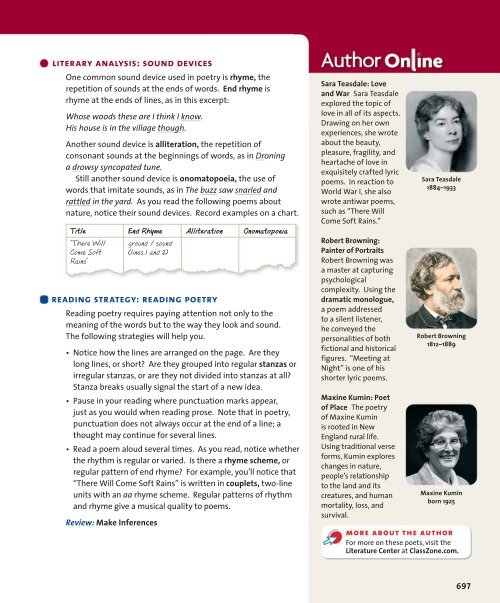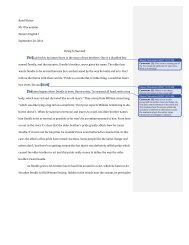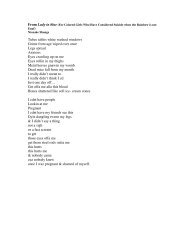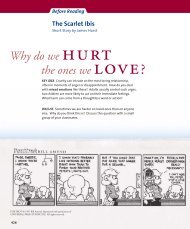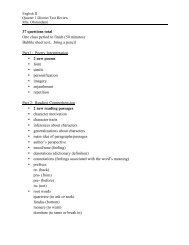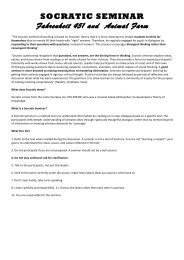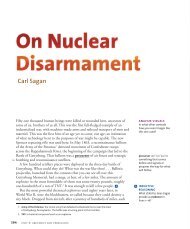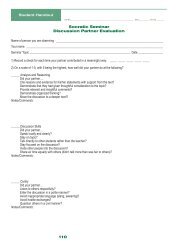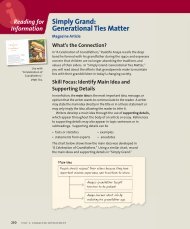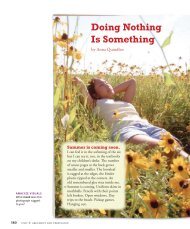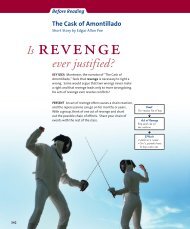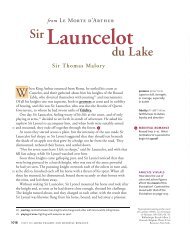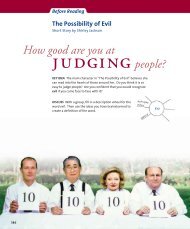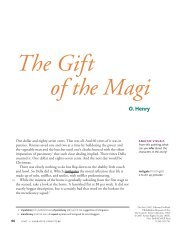The Language of Poetry - LanguageArts-NHS
The Language of Poetry - LanguageArts-NHS
The Language of Poetry - LanguageArts-NHS
You also want an ePaper? Increase the reach of your titles
YUMPU automatically turns print PDFs into web optimized ePapers that Google loves.
literary analysis: sound devices<br />
One common sound device used in poetry is rhyme, the<br />
repetition <strong>of</strong> sounds at the ends <strong>of</strong> words. End rhyme is<br />
rhyme at the ends <strong>of</strong> lines, as in this excerpt:<br />
Whose woods these are I think I know.<br />
His house is in the village though.<br />
Another sound device is alliteration, the repetition <strong>of</strong><br />
consonant sounds at the beginnings <strong>of</strong> words, as in Droning<br />
a drowsy syncopated tune.<br />
Still another sound device is onomatopoeia, the use <strong>of</strong><br />
words that imitate sounds, as in <strong>The</strong> buzz saw snarled and<br />
rattled in the yard. As you read the following poems about<br />
nature, notice their sound devices. Record examples on a chart.<br />
Title<br />
“<strong>The</strong>re Will<br />
Come S<strong>of</strong>t<br />
Rains”<br />
End Rhyme<br />
ground / sound<br />
(lines 1 and 2)<br />
reading strategy: reading poetry<br />
Alliteration Onomatopoeia<br />
Reading poetry requires paying attention not only to the<br />
meaning <strong>of</strong> the words but to the way they look and sound.<br />
<strong>The</strong> following strategies will help you.<br />
• Notice how the lines are arranged on the page. Are they<br />
long lines, or short? Are they grouped into regular stanzas or<br />
irregular stanzas, or are they not divided into stanzas at all?<br />
Stanza breaks usually signal the start <strong>of</strong> a new idea.<br />
• Pause in your reading where punctuation marks appear,<br />
just as you would when reading prose. Note that in poetry,<br />
punctuation does not always occur at the end <strong>of</strong> a line; a<br />
thought may continue for several lines.<br />
• Read a poem aloud several times. As you read, notice whether<br />
the rhythm is regular or varied. Is there a rhyme scheme, or<br />
regular pattern <strong>of</strong> end rhyme? For example, you’ll notice that<br />
“<strong>The</strong>re Will Come S<strong>of</strong>t Rains” is written in couplets, two-line<br />
units with an aa rhyme scheme. Regular patterns <strong>of</strong> rhythm<br />
and rhyme give a musical quality to poems.<br />
Review: Make Inferences<br />
Sara Teasdale: Love<br />
and War Sara Teasdale<br />
explored the topic <strong>of</strong><br />
love in all <strong>of</strong> its aspects.<br />
Drawing on her own<br />
experiences, she wrote<br />
about the beauty,<br />
pleasure, fragility, and<br />
heartache <strong>of</strong> love in<br />
exquisitely crafted lyric<br />
poems. In reaction to<br />
World War I, she also<br />
wrote antiwar poems,<br />
such as “<strong>The</strong>re Will<br />
Come S<strong>of</strong>t Rains.”<br />
Robert Browning:<br />
Painter <strong>of</strong> Portraits<br />
Robert Browning was<br />
a master at capturing<br />
psychological<br />
complexity. Using the<br />
dramatic monologue,<br />
a poem addressed<br />
to a silent listener,<br />
he conveyed the<br />
personalities <strong>of</strong> both<br />
fictional and historical<br />
figures. “Meeting at<br />
Night” is one <strong>of</strong> his<br />
shorter lyric poems.<br />
Maxine Kumin: Poet<br />
<strong>of</strong> Place <strong>The</strong> poetry<br />
<strong>of</strong> Maxine Kumin<br />
is rooted in New<br />
England rural life.<br />
Using traditional verse<br />
forms, Kumin explores<br />
changes in nature,<br />
people’s relationship<br />
to the land and its<br />
creatures, and human<br />
mortality, loss, and<br />
survival.<br />
Sara Teasdale<br />
1884–1933<br />
Robert Browning<br />
1812–1889<br />
Maxine Kumin<br />
born 1925<br />
more about the author<br />
For more on these poets, visit the<br />
Literature Center at ClassZone.com.<br />
697


